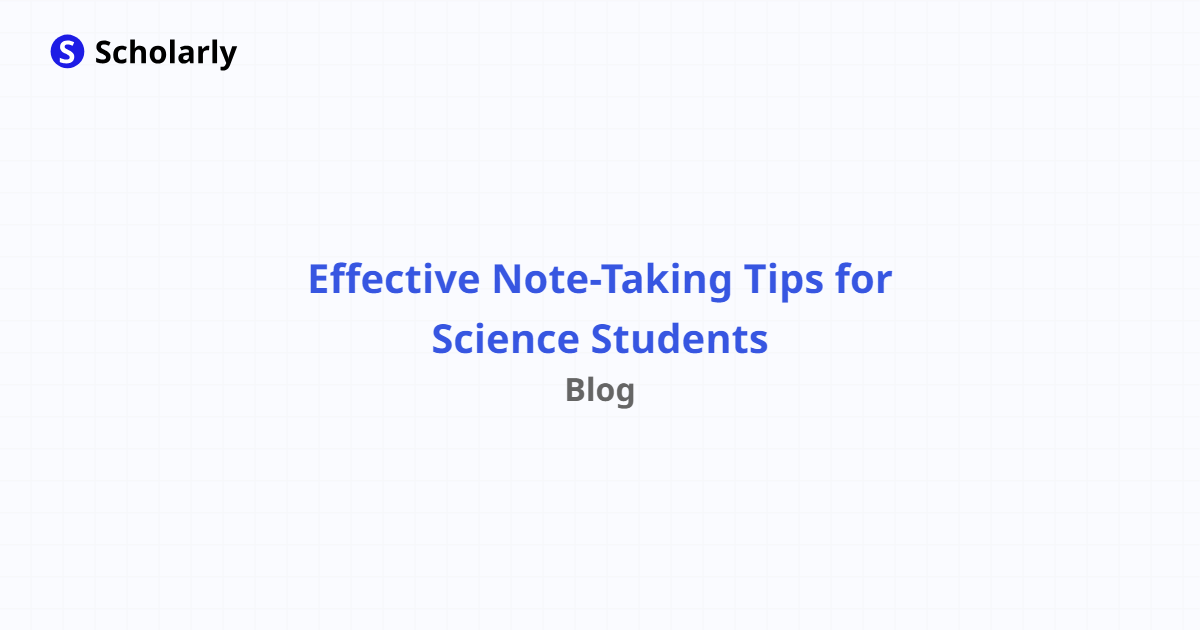Effective Note-Taking Tips for Science Students
Learn valuable tips for science students to enhance their note-taking skills and improve their understanding and retention of scientific concepts.

Introduction
Note-taking plays a crucial role in the academic success of students, particularly in the field of science. Effective note-taking techniques can help science students organize information, enhance understanding, and retain complex scientific concepts. In this article, we will provide valuable tips for science students on how to take effective notes that will optimize their learning experience.
Importance of Note-Taking in Science
Note-taking is especially crucial in science subjects due to their complex nature and extensive use of technical terms and concepts. Science students often need to process large amounts of information and understand various scientific principles. Effective note-taking helps students in:
- Organizing Information: Note-taking allows students to structure and organize scientific knowledge, making it easier to review and retrieve information later.
- Enhancing Understanding: Actively engaging in note-taking helps students comprehend and internalize scientific concepts.
- Retaining and Recalling Information: Well-organized and detailed notes serve as an excellent resource for revision, aiding in long-term retention of scientific knowledge.
Effective Note-Taking Strategies
To optimize note-taking in science, students can implement the following strategies:
1. Use a Structured Format
Structured note-taking formats, such as Cornell notes or mind maps, provide an organized framework to capture key information. These formats include designated sections for important concepts, supporting details, and summary.
2. Listen Actively and Engage
Active listening is a critical aspect of effective note-taking. Students should listen attentively to the instructor or read the textbook actively, identifying and highlighting key points, definitions, and examples.
3. Use Abbreviations and Symbols
In science classes, where time is often limited, using abbreviations and symbols can significantly enhance the speed and efficiency of note-taking. Develop a system of shorthand and symbols that work for you and can be easily understood during revision.
4. Focus on Key Concepts and Relationships
Rather than transcribing everything, focus on understanding and capturing the key concepts and their relationships. This approach helps to identify the most important aspects of the lecture or textbook and promote deeper understanding.
5. Organize and Review Regularly
After each class or study session, take a few minutes to review and organize your notes. Clarify any unclear points, fill in missing information, and create connections between different concepts. Regularly reviewing your notes will strengthen your understanding of the material.
Tools and Techniques for Digital Note-Taking
For students who prefer digital note-taking, various tools and techniques can be beneficial:
1. Note-Taking Apps
Utilize note-taking apps like Evernote, OneNote, or Notion, which provide features like organization, synchronization across devices, and search capabilities. These apps also allow easy integration of multimedia content like images and audio recordings.
2. Digital Annotation Tools
Digital annotation tools like GoodNotes or Notability enable students to write directly on lecture slides or PDFs. These tools often offer highlighting, underlining, and drawing capabilities, enhancing the interactive and visual nature of note-taking.
3. Voice Recording
Digital note-taking platforms often have the option to record audio simultaneously. This feature can be invaluable for capturing detailed explanations or complex concepts during lectures or study groups.
Conclusion
Effective note-taking is a fundamental skill for science students to succeed academically. By following structured formats, actively listening and engaging, and utilizing tools and techniques for digital note-taking, students can enhance their learning experience and gain a deeper understanding of scientific concepts. Remember, effective note-taking is not about jotting down every word, but about capturing essential information and making meaningful connections. Implement these tips into your note-taking routine, and watch your comprehension and retention of science improve significantly.
Try Our Popular AI Study Tools
Transform your study materials into interactive learning experiences with our most popular AI-powered tools:
PDF to Flashcards
Convert lecture notes and textbooks into study flashcards instantly
Text to Flashcards
Turn any text or notes into comprehensive flashcard sets
Image to Flashcards
Convert diagrams and handwritten notes into digital flashcards
YouTube to Flashcards
Generate flashcards from educational video content



